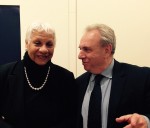Keynote speaker Senator Anne Cools with Janusz Korczak Association of Canada president Jerry Nussbaum. (photo from JKAC)
The third session of the six-part Janusz Korczak Lecture Series “How to Love a Child” took place Nov. 25 at the Robert H. Lee Alumni Centre. Co-sponsored by the University of British Columbia faculty of education and the Janusz Korczak Association of Canada, this well-attended lecture – The Evolution, Current Status and Future of the “Best Interests of the Child” Principle in the Protection of Children’s Rights – drew people from all walks of life. Among the attendees were teachers, children’s rights activists, Janusz Korczak association members, the general public and students.
The lecture’s moderator, Dr. Edward Kruk, associate professor of social work at UBC, who specializes in child and family policy, opened the evening’s program, while I brought Dr. Janusz Korczak into focus by briefly discussing the fate of children in war zones, relating the topic to Korczak’s care of children during the Second World War.
The Hon. Anne Cools, senator for Toronto Centre-York and Canada’s longest serving senator, was the keynote speaker. Among her many accomplishments in social services, she founded one of Canada’s first battered women’s shelters. Her talk centred on what has been done in the best interest of the child. She spoke about the ramifications in her areas of expertise – domestic violence, divorce, child custody and shared parenting – and how the interaction of politics, government and the law provide a complex arena in which the child’s fate is often lost.
The three panelists that followed Cools each shed light on a different aspect of children’s well-being.
Beverley Smith, representing the field of child care, is a longtime women’s and children’s activist from Calgary. Among many honors, she received the Queen’s Golden Jubilee Award for her work. She spoke about working parents and daycare, including how this separates children from their loved ones and how the worth of a stay-at-home parent’s work (usually the mother) is undervalued by the government. In this context, she referred to Korczak, who, among other things, acted in the best interest of the child by advocating that children’s voices need to be heard on the subject of their own care and needs.
The second panelist, Cecilia Reekie, a member of the Haisla First Nation, is an adoptee. Sitting on many boards, her expertise is in the areas of aboriginal culture, truth and reconciliation. She represented the field of child protection, speaking from the heart and sharing her story with the audience. She said that she was lucky to eventually have been adopted by people who became caring and supportive parents, thus enabling her to grow and succeed in life. However, she said, many other aboriginal children have not had such luck. In fact, she said, “indigenous children are disproportionately represented in the child protection/welfare system across Canada.”
The final panelist, Eugenea Couture, is an author, mentor and advocate for child custody law reform. She is the recipient of the 2014 YMCA Power of Peace Medal and the 2014 Foster Children’s Day Award. Because of her own experience of having gone through divorce and child custody trials, she knows how divorce can become a war zone, the children its casualties. “How can we expect a child who is ripped from their family environment to feel worthy of love and belonging?” she asked. “It will not matter what they hear, because the backlash of taking them into care already speaks volumes of trauma.”
To register for the next lecture in the Janusz Korczak series – The Human Rights of Aboriginal Children, with keynote speakers Dr. Mary Ellen Turpel-Lafond, B.C. representative for children and youth, and Dr. Michael DeGagné, president and vice-chancellor of Nipissing University – visit jklectures.educ.ubc.ca. There is no cost to attend. The lecture takes place on Jan. 21, 7 p.m., at the alumni centre.
Lillian Boraks-Nemetz is a Vancouver-based author and a board member of the Janusz Korczak Association of Canada.

